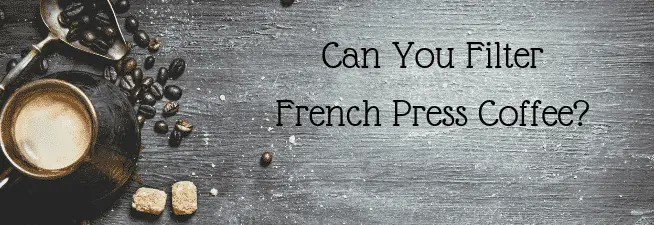
A large part of the reason people love the French Press, aside from its delicious coffee of course, is the convenience.
A French Press allows you the freedom to simply brew, pour and go.
Adding the additional step of filtration may be cumbersome for those seeking a quick and delicious cup in the morning.
Others who have a few extra moments may be inclined for the potential results.
Let’s face it, the last sip of French Press coffee is always given to the sink. No one likes the texture of powdery coffee beans.
A French Press filter can be an easy method to strain off those finer bits without losing out on the flavor you love.
Reducing Particles
- Use a coarser grind
- Pour through a secondary, finer filter
- Allow the sediment to settle
- Skim the surface before pouring
First, let’s talk about how the grind can change the flavor profile of the coffee.
Grind, Coarse or Fine?
Typically, a French Press will use a coarsely ground coffee. This can be the right size according to the way you like to brew your coffee.
If you find your coffee is on the bitter side, you may adjust the grind to be finer. If you find your coffee on the sour side, you might like the grind to be coarser.
See this post for more on the differences between sour and bitter coffee.
Other adjustments can be made to change the flavors of the coffee including adjusting brewing time and temperature.
For those with the time for additional filtration, a finer grind can be used to release more flavor and acquire deeper notes from the beans.
Fine ground coffee made in a French Press allows a chance for the immersion brewing to develop flavors that may otherwise be drowned out with bolder, more bitter notes.
For a cup with sweetness, acidity and a touch of bitter boldness, a fine grind can be perfection.
Related – Check out the following posts to see my favorite insulated French presses and the largest French presses I’ve experimented with.
Secondary Filtration
Some French Presses come with an additional fine mesh strainer at the pouring spout, while others only offer one mesh strainer. An upgrade to a double filtered French Press may be the only adjustment needed for some.
For others, an extra step of a fine mesh filter or disposable paper filter may be the best option.
Secondary filtration is always recommended for using a finely ground coffee in a French Press.
Allowing the Sediment to Settle is a Common Option
Sit back with your cup of coffee and let it relax with you for a while.
Working slowly while pouring from the French Press can reduce how much sediment is stirred up and poured into your cup.
You can also let your cup chill for a while to allow any fine particles to settle to the bottom.
Leave the last few sips for the sink!
Skimming the Surface
Another option is to lightly skim the surface of the coffee with a spoon, or a small mesh strainer. A tea ball can work great for this purpose.
As there are about 30 seconds left in your brew, skim the surface particles with your spoon or strainer, then press as normal.
You will find a significant decrease in particles with this method.
To Filter or Not to Filter – The Paper Filter Conundrum
The benefits of filtration can include offering the coffee a little extra time to develop a full-bodied flavor as it filters through the beans again. The texture may be slightly more appealing, especially as the cup comes toward the end.
If you prefer the flavor of a finely ground coffee in the French Press then a filter will almost certainly be required.
A paper filter is the least optimal choice as it will leech oils from the coffee and take away from the flavor.
For those who enjoy the flavor given by medium and coarse roasts that are filtered through the French Press, an additional filtration step may take away from the full-bodied flavor of the coffee that is enjoyed.
Part of what makes French Press coffee taste so good is that tiny particles of coffee tone down the acidity of the coffee and offer a bolder, fuller flavor profile. This is one of the main aspects of unfiltered coffee and it’s what you typically want to some degree from a French press. In my opinion if you filter them out with paper you might as well just brew with a different device, perhaps a coffee dripper.
Let’s now compare filtered to unfiltered coffee a bit closer to see if there are more differences.
The Main Differences Between Filtered and Unfiltered Coffee
Once only a popular trend in European countries, the french press recently invaded the american coffee discourse, which has lead many coffee enthusiasts to purchase and place such machines in their kitchens.
This trend has subsequently lead to the formation of questions such as “is unfiltered coffee bad for me?”, “good for me?”, and “what is the difference between filtered and unfiltered coffee?”.
The Differences Between Unfiltered and Filtered Coffee
- Means of Production
- Oil Levels
The Means of Production
Easily the simplest difference between unfiltered coffee and filtered coffee is the machines used to produce both.
Filtered coffee is normally produced using a drip coffee maker or and espresso machine which contain paper or metal filters. These filters prevent the coffee grounds from making their way into the final beverage.
Unfiltered coffee, like we already discussed, is normally produced using a french press. This machine lacks a coffee filter. Instead, the french press uses a mesh plunger to squeeze and trap the coffee grounds at the bottom of its glass pitcher. However, it is not uncommon for unfiltered coffee to contain an amount of coffee grounds in its final beverage.
Turkish coffee, is another form of unfiltered coffee. In this production process extremely fine grounds of coffee are used without a filter. These grounds remain in the final beverage.
The Oil Levels That Make it to Your Cup
Coffee’s oils are extracted during the brewing process, but almost always (unless a product of over extraction) more oil remains in the coffee grounds. Since a filter is used in the brewing process, filtered coffee only contains the oils that are extracted from the grounds during production.
However, as its name suggests, unfiltered coffee’s lack of a filter allows more of the coffee’s oils to end up in the final beverage. Now, this might produce a sought after flavor profile, but it also allows tiny substances called diterpenes to end up in the brewed beverage.
These tiny substances, which are naturally found in coffee, have been linked in the past to heart attacks, stroke, and heart disease.
Doctors have also stated that these particles are dangerous because the raise individuals LDL cholesterol levels.
These same doctors have warned that drinking an excess of five cups of unfiltered coffee a day can have negative effects on your health.
See this post for a more comprehensive look at the health effects of coffee.
It is important to keep in mind that even though the last few sips may be best left in the cup, the reason many choose the French Press is for the flavor experience it offers.
Without these tiny particles, you may find that your coffee is just missing something you can’t quite put your finger on.
What’s in your coffee cup?
